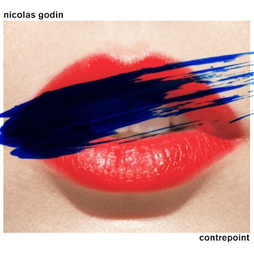Nicolas Godin has always been a renaissance man, but now on his first solo debut he’s reaching into the triumphal final phase of that celebrated cultural epoch, bringing the baroque into the 21st century. It’s not an unfathomable feat, and certainly not too much of a stretch of the imagination; Brian Wilson, The Beatles, the Bee Gees etc etc, have all farmed the 18th century for ideas, but an album that exclusively mines the oeuvre of Johann Sebastian Bach by way of Canadian concert pianist Glenn Gould is a bit more unusual.
Contrepoint (or counterpoint in English) is a meticulously-executed album of works that conflates obsessive geekery with a heightened sense of melody, all the great things that Godin has brought to Air over the last 20 years. Without his musical cohort Jean-Benoît Dunckel by his side, Godin is free to indulge his passions and explore his experimental whims yet further, and this lonerism definitely suits him, for this album at least. One senses this is a labour of love that has consumed him, borne of the same esprit méticuleux that saw him suggest using the gamut of electronic instrumentation to Jean-Michel Jarre on a recent collaboration, from the first oscillators to the iPad, taking in loops with scissors and magnetic tape, the Moog, the fairlight and the sampler and everything else in between. It’s the kind of fastidiousness that is maybe a touch too much for a pop outfit like Air. A solo follow up might be some way off then, but there’s plenty to enjoy while we’re here.
Borrowing a phrase from the aforementioned Gould, Godin says that around 2010 he felt like he’d become "a travelling monkey in the concert circus". Inspired by the 20th century Canadian polymath’s output (Gould was a writer, critic, composer, conductor and broadcaster), steered Godin onto the path that would eventually lead to this most intriguing of releases.
On each track, Godin metaphorically assumes the old wig at the outset, though where each song takes us is another matter entirely; ‘Club Nine’, for instance, clearly owes a debt to the Dave Brubeck Quartet’s 1959 west coast cool jazz classic ‘Take Five’. ‘Orca’, which was released first – creating some bewilderment and awe with its distorted stabs of violence, its labyrinthine complexity and virtuoso delivery – is like a dystopian videogame starring Justice running up and down stairs in a bid to escape monsters. To take something so recognisably classical and modernise it could have ended up like some hamfisted 21st century update on Walter Murphy’s disco Beethoven, whereas on ‘Widerstehe Doch Der Sünde’ – based on Bach’s Cantata BWV 54 (and meaning "just resist sin" in German) – it has the lightness of touch of Gainsbourg updating his favourite Chopin, with a bit of the Beatles’ ‘Blue Jay Way’ thrown in for good measure. ‘Clara’ featuring Marcelo Camelo has an ambient, almost noirish quality, while ‘Quel Due’ features some moody Italian spoken word (which Godin is of course no stranger to).
Significantly, despite the potential for clutter that the title suggests, the Frenchman leaves enough space for everything to live harmoniously together. Melodies and countermelodies run free, but nothing ever feels overblown or unnecessary. A lesser mortal might have made a mess of things here, but Godin brings the weight of his experience to deliver an album of both quality and maturity, but not so mature that all the fun is stifled. There’s even room for a pun on track seven – ‘Bach Off’ – but why no ‘Air On A G String’?
<div class="fb-comments" data-href="http://thequietus.com/articles/18838-nicolas-godin-contrepoint-review” data-width="550">


